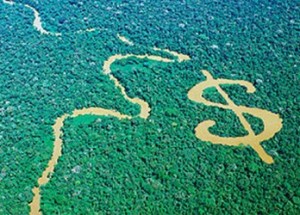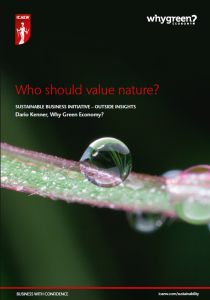Who values nature: the power to create new biodiversity markets?
Dario Kenner (Why Green Economy?) 9 February 2015
Has the time come for economic valuation of ecosystems or will this weaken conservation by commodifying nature? Who values nature could be crucial to what happens after valuation.
For many, nature has intrinsic value which means it’s unquantifiable and priceless. The process of economic valuation attempts to go beyond this to quantify and place economic values on ‘ecosystem services’ – for example, the global value of pollination by bees has been estimated to be $190 billion a year.
For my part, I have been looking into an under-researched aspect of this debate: who would do the valuing in the first place? To try and answer this question I think it’s useful to consider how actors value nature in developing countries as this is where the vast majority of the world’s population lives and because these countries have high levels of environmental degradation (partly due to developed countries outsourcing their resource consumption).
 Looking at the range of actors operating in the global south it’s clear that they all value nature differently (for example governments, academics, consultancy firms and indigenous peoples). To date it has mainly been expert bodies such as academics, NGOs and consultancy firms who are valuing nature via a set of valuation methodologies that tend to focus on monetary valuation. By contrast, indigenous peoples and local communities, whose livelihoods directly depend on their local environment, already value nature.
Looking at the range of actors operating in the global south it’s clear that they all value nature differently (for example governments, academics, consultancy firms and indigenous peoples). To date it has mainly been expert bodies such as academics, NGOs and consultancy firms who are valuing nature via a set of valuation methodologies that tend to focus on monetary valuation. By contrast, indigenous peoples and local communities, whose livelihoods directly depend on their local environment, already value nature.
They often recognise non-monetary values based on a spiritual connection to their ancestral lands and collective use of the commons, rather than using economic ideas based on individual self-interest and a separation of humans from nature. Brazilian indigenous leader Davi Yanomami explains, “The forest gives us life, we value the forest, and for us, the forest is priceless.” Pavan Sukhdev (a leading figure in initiatives that call for economic valuation) told me: “it is for society at large to decide whose valuation counts. We can only be certain that all these valuations will be different.”
Since actors approach value so differently, the issue of land rights is crucial given they are highly contested in the global south. For example, research shows that out of 73,000 government concessions to private companies for mining, oil, gas and agriculture in Brazil, Cambodia, Colombia, Indonesia, Liberia, Mozambique, Peru, and the Philippines, more than 93% involved land inhabited by indigenous peoples and local communities. Disputed land rights in these bio-diverse regions raise the possibility that there could be competing valuations (monetary or non-monetary) by stakeholders for the same ecosystems.
 Another important question concerns ‘critical habitats’, defined as the necessary preconditions for functioning ecosystems, such as climate regulation or fertile soil. The reason the distinction between critical and non-critical habitats is important is that this could be the classification that’s used to decide whether economic valuation takes place. For example some proponents of valuing ecosystems acknowledge that critical areas of biodiversity are very difficult to measure in monetary figures. But who decides what counts as a critical habitat? What if different actors in developing countries disagree? This is a valid question given that estimates put around 80% of remaining healthy ecosystems within the traditional territories of indigenous peoples. Indigenous people’s relationship with the environment is often based on an understanding that all of nature is interdependent and thus all habitats (whether defined by others as critical and non-critical) are crucial to sustaining life. Ultimately, whether economic valuation goes ahead comes down to which actors in the global south have the power to limit valuation to non-monetary values or to extend it to monetary values.
Another important question concerns ‘critical habitats’, defined as the necessary preconditions for functioning ecosystems, such as climate regulation or fertile soil. The reason the distinction between critical and non-critical habitats is important is that this could be the classification that’s used to decide whether economic valuation takes place. For example some proponents of valuing ecosystems acknowledge that critical areas of biodiversity are very difficult to measure in monetary figures. But who decides what counts as a critical habitat? What if different actors in developing countries disagree? This is a valid question given that estimates put around 80% of remaining healthy ecosystems within the traditional territories of indigenous peoples. Indigenous people’s relationship with the environment is often based on an understanding that all of nature is interdependent and thus all habitats (whether defined by others as critical and non-critical) are crucial to sustaining life. Ultimately, whether economic valuation goes ahead comes down to which actors in the global south have the power to limit valuation to non-monetary values or to extend it to monetary values.
Will who gets to value nature determine whether environmental markets are created?
It’s key to explore the connections between certain types of valuation and what happens afterwards. Debates on valuing nature often focus on whether economic valuation will automatically lead to the creation of ‘natural capital’ markets. Some proponents such as Tony Juniper say it will be possible to stop the process at the economic valuation and this does not necessarily mean that nature has to be ‘priced’. A UNEP briefing notes “demonstrating the economic value of nature should not, and does not, always lead to the marketization of nature”. But if a government or company wanted to create or participate in a new environmental services market after economic valuation, how would this be stopped in practice? Could Pandora’s Box be closed?
Critics such as George Monbiot argue natural capital accounting involves pricing the natural world which is likely to lead to a market in ‘ecosystem services’. Civil society movements including Friends of the Earth International that reject economic valuation say “putting a price on Nature is a prerequisite for financialization to become a reality. Pricing makes it possible to buy and sell Nature”.
So far the debate has mainly been in abstract terms, but by looking at who values nature in developing countries it allows us to explore what might happen in practice when a diverse range of stakeholders are involved e.g. governments, companies and local communities. For example, in one area of the Amazon rainforest a company might calculate the monetary value of trees capturing carbon dioxide which it could then trade in new environmental services markets. Meanwhile in another part of the Amazon (or the same area if land rights are contested) an indigenous community might value nature’s cultural and spiritual importance as priceless – would this mean that trading is not possible? If the type of valuation affects whether markets are created or not, then it clearly matters who values nature.
————————————
This article was originally published by the Green Economy Coalition. This blog focuses on the key themes in the report Who should value nature? published by the Institute of Chartered Accountants in England and Wales (ICAEW) in December 2014.
Read the full report
Read exclusive interviews from the report with:
Pavan Sukhdev (CEO GIST Advisory, United Nations Environment Programme Goodwill Ambassador, TEEB Study Leader),
Richard Mattison (Trucost),
Thabit Jacob (Co-organiser, Green Economy in the South conference),
Teresa Pérez (World Rainforest Movement),
Giles Atkinson (Member of Natural Capital Committee, United Kingdom),
Joan Carling (Asian Indigenous Peoples Pact, Member of United Nations Permanent Forum on Indigenous Issues),
Davi Kopenawa Yanomami (spokesman for the Yanomami indigneous people),
Yoni Rivas (Movement of Unified Farmers in Aguán, MUCA).


Interesting article. In Italy we are carrying out a project to evaluate, also in monetary terms, the ecosystem services in 20 sites, and creating with the stakeholders systems to pay for that services. So the transactions will be not only public > private but also private > private. This will help to have financial resources to maintain the ecosystems producing the goods.
For May/June 2015 we are preparing a international congress to present the first results of the project and to interact with other similar initiatives.
To know more visit ou web site: http://www.lifemgn-serviziecosistemici.eu/EN/home/Pages/default.aspx
Stefano Picchi – project manager of LIFE MGN project lead by CURSA consortium
great article with great insights